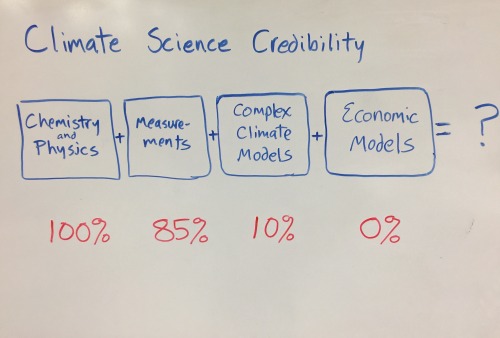![]()
Scott Adams:
I worry that climate scientists think the skeptics are just dumb. I’m sure there are plenty of dumb people on every topic, but I’m here to suggest that the bigger problem might be a form of pattern recognition. I’ll take you through that thought.
I’ll start by displaying my own pattern-based starting point for the climate change issue. I don’t present my opinion as truth or fact. This is a description of my biases, a result of all the patterns I have observed over my lifetime. If you have observed different patterns, I would expect you to have different biases. Here’s a whiteboard graphic of my starting biases on climate change.
I’m not a scientist, but it seems to me that the chemistry and physics parts of climate science are probably pretty locked down. I give that stuff full credibility.
The measurements of temperature, ice, and sea levels over time are probably fairly good, but I observe disagreements among scientists on how best to measure. I’ll give the measurements an 85% credibility.
When it comes to the complex climate models, I’ve never seen a complex, iterative model – of the type that includes human assumptions and human measurements – reliably predict the future multiple years out. I don’t think it has ever been done, and perhaps it never will be. I give the complex climate models a 10% credibility rating. And I am only that generous because perhaps this is the exception to the pattern I observe that says complexity always hides the future, as opposed to predicting it.
This is a good time to remind you that I have neither the qualifications nor the time to evaluate the climate science models on my own. So I’m stuck with using pattern recognition – which is not science, and it is not reason. And my pattern recognizer says humans use complexity of this sort to hide the truth, not to reveal it. If scientists want to change my mind, they need to show me historical examples in which things “like this” did a good job of predicting the future. You have to work on my pattern memory to change my mind, not my knowledge of climate science.
The last box in my graph, the economic models, have no predictive power for this topic, or any other. Long term economic models are like astrology with good manners. I have a degree in economics, and an MBA, and I spent years in corporate America making financial projections. My experience tells me that the people creating the models can get any result they want. None of that looks like science to me. I give the economic models zero credibility, just like every other economic model that pretends to see the future.
When I talk to people who believe the climate change models and the economic models are accurate, I observe another pattern. The people who have the least real-world business experience think the experts probably know how to do this sort of thing. That observation might be nothing but confirmation bias on my part, but if you want to change my mind, that’s part of your challenge.

